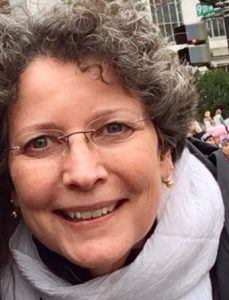At the 10th anniversary celebration of the Maternal Health Task Force, The Global Maternal Health Symposium, 10 Maternal Health Visionary awards were presented. The recipients were honored for the impact, innovation, inspiration, leadership, and future vision they have provided to the field of Maternal Health. This blog series highlights the work of these maternal health visionaries.
Maternal Health Visionary Spotlight: Theresa Shaver, White Ribbon Alliance founder – and current Senior Maternal Health Advisor in the Office of Maternal and Child Health and Nutrition, USAID Bureau for Global Health – reminds us to stay bold together as we continue to work toward a global movement to end Maternal and Neonatal Mortality
When Theresa Shaver and her colleagues envisioned the White Ribbon Alliance (WRA), they were driven by a combination of grief and hope. Grief over the preventable deaths of mothers and babies worldwide and hope that a coalition of dedicated people could make a difference. Since the color white symbolized both, it was a perfect choice. WRA was born on Mother’s Day in 1999.

A shared conviction that no woman should die while bringing life to a child, drove those in WRA to campaign for maternal health all over the world, including places with no history of investing in women’s health and even less open to advocacy. Theresa explained, “the conditions existing at the time were a call to action. There was, and there remains, a sense of urgency to eliminate maternal and neonatal mortality.” Today, WRA is an established nonprofit, operating in 15 countries with an expanded mission of activating a people-led movement for reproductive, maternal and newborn health and rights. By putting citizens at the center of global, national and local efforts, WRA has accelerated policy making and continues to create effective changes in maternal and neonatal health.
Theresa has had an amazing career, and she shows no signs of retiring. She is heartened by the progress that is made each year in the field and yet is quick to remind us that, “there 300,000 maternal deaths each year, 2.5 million neonatal deaths, and 2.6 million stillbirths.” Her advice for the future?
“We must enroll the next generation of advocates so that maternal and newborn health is a growing political priority here at home and in countries around the world”
That message holds especially true for the United States, where maternal mortality is on the rise and racial inequalities in maternal health outcomes are unacceptably large. As Theresa explains: “if you break it apart, it’s about equity, it’s about race, and economics.” She points to the California Maternal Quality Care Collaborative as a beacon of hope for reversing maternal mortality trends in the United States. “That is the way forward.” Theresa says. “We have to work collectively across disciplines to make maternal and neonatal health a social and financial priority. The aspects of equity and race need to be addressed head on.”
There are lessons in other countries for the United States as well. Theresa points to initiatives around respectful maternity care in lower-income settings that could improve current profit driven models established by the health care industry. An open dialogue would benefit both the United States and the rest of the world, Theresa says, but often information only travels one way.
Work to end deaths in childbirth must continue, and Theresa has some words of wisdom for the next generation: “It was definitely a risk when WRA launched in 1999; however, there were successful models to learn from. We studied the HIV movement, the work of La Leche League International, the efforts of Greenpeace, and the sustainability of the World Wildlife Fund that was founded in 1961. Be bold. Learn what went well and what did not. Together, we can effect positive change.”
